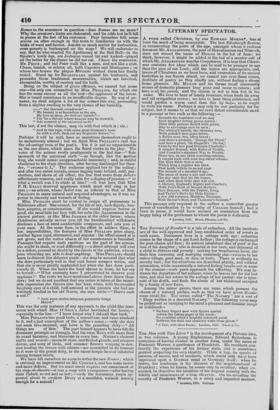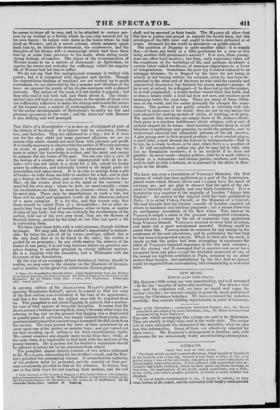THE Man with Two Lives * is the development of
a Platonic idea, in two volumes. A young Englishman, Edward Sydenham, is conscious of having existed in another form, under the name of Frederick Werner, a gentleman of Frankfort. He recollects con- fusedly the experience of his former state, and is sometimes puzzled respecting his own identity. While a boy, he speaks of persons, of scenes, and of incidents, which could only have been impressed upon a German mind in Germany itself: when he draws, his landscape is the likeness of the neighbourhood of Frankfort ; when lie learns, he seems only to recollect; when ex- amined, he describes the localities of his original country with the fidelity and minuteness of a long observer. On his revisiting the country of Frederick Werner, in a misty and imperfect manner, • Loader), 1828. Colburn. he seems to know all he sees, and to be attached to various per- sons by an instinct or a feeling which he can only account for by his own theory : he lodges once more in the house where he had dwelt as Werner; and in a secret cabinet, which memory again leads him to, he detects the memorials, the confessions, and the thoughts of his former self—a manuscript which had been there laid up at some time previous to his death, when acting under strong feelings of remorse. The object of the transmigration of Werner seems to be a species of atonement : as Sydenham, he repairs the errors and consoles the sufferings which the singular life of Werner had led him to inflict.
We do not say that this metaphysical romance is written with power; but it is composed with elegance and facility. Though the superstitious feelings of mankind are not worked up to much excitement, we are interested by the character and 'situation of the hero : we unravel the puzzle of his double existence with a pleased curiosity. The nature of the work will not render it popular; but they who read it will both talk and think about it. The funda- mental idea will lead to many reflections in the minds of those who are sufficiently reflective to make the strange and wonderful nature of the human soul a subject of contemplation. We should refer to the earlier developments of Sydenham's bi-entity for fair and pleasine.6 specimens of the work • and the interview with Mesmer is also striking and well managed.



















 Previous page
Previous page